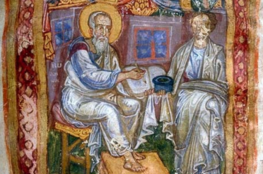Symphonia, as a theological-political concept, is practically dead in our times. Maybe, just maybe, a few glimmers exist in contemporary Russia, though a large body of critics, including political scientists and churchmen, think otherwise. What may look something like symphonia at first blush is merely a (post)modern form of caesaropapism, with the Russian Orthodox Church serving as the handmaid of the Russian state. The Moscow Patriarchate’s “Russian World” ecclesial ideology fits snugly with secular Russia’s larger international ambitions—ambitions that have made themselves violently felt in places like Georgia and Ukraine over the past several years. In other parts of the so-called Orthodox world nothing like sympahonia exists. It certainly does not exist in the Middle East nor in Greece, where the state finds its future crushed on the heel of the European Union while the Orthodox Church remains almost powerless to provide firm moral guidance under seemingly impossible conditions. Integralism, which has become a rallying cry for a small (but dedicated) band of Catholics, is certainly not dead, but it remains, at best, a theory and, at worst, a concept without teeth. There are more than a few of those floating around right now. May we forever be spared the suggestion of a coming “Integralist Option” or, for the symphonia crowd, a “Justinian Option.”
Truth be told, I am far more sympathetic toward integralism than symphonia, especially at this point in history. The symohonia model only works under political conditions which haven’t existed for centuries. For the Church to exercise a harmonious presence in society there needs to be an emperor (or some other governing body) who recognizes, without hesitation or qualification, both the rights of the Church and his unyielding responsibility to care for her in a three-dimensional manner. Russia, as noted, may (or may not) represent something akin to an exception, but it is a distant exception—and one not replicable in the West where no Christian confession, especially not Orthodoxy and certainly not Catholicism, is capable of inaugurating what would amount to a socio-political revolution. Not even the Pope, who at various times and in diverse ways has exercised top-down political authority, has the clout to make that a possibility. And so why wait around for it?
The integralist turn, on the other hand, provides an opportunity for Christians to live out their faith in society even if that society has no interest in being Christian. There is a transformative goal at the heart of integralism which may be under-theorized at this juncture but is certainly not lost. Too much focus seems to be placed on the “spirit of resistance” at the heart of integralism and less on the virtues of hope, love, and charity that makes integralism work. To acknowledge, as fewer and fewer Catholics do, the social Kingship of Christ is not to dream of a concrete monarchical order replacing the present liberal-democratic one (though that’s hardly a bad dream, is it?) but to both work for and live in harmony with the theological principle that Christ—Priest, Prophet, and King—sits at the head of both His Church and political society. How integralism plays out in contemporary America or the West writ large needs considerable development. There’s some reason to worry nobody is prepared to develop it at all.
Some Orthodox will likely object that integralism, along with a more sharply defined understanding of Christ’s social Kingship, is not part of “their tradition” and therefore inappropriate to consider. Maybe, though such a view seems both premature and irrationally dismissive. Perhaps another way to look at the matter is to ask what exists in the vast, sophisticated, and oft-ignored Eastern Christian patrimony which fully allows an Orthodox Christian to not only accept the integralist thesis, but to deepen and expand it as well. Even if the sources are obscure, it’s no doubt safer to bet that there is more in the Eastern tradition that at least tacitly accepts integralism rather than the retreatism being embraced by a few contemporary Orthodox.
None of this is to say that Orthodox and (primarily traditional) Catholics can or will see eye-to-eye on this matter. The Orthodox, sometimes fairly, have a reputation for anti-Catholic bigotry which, on occasion, is met by Roman Catholic triumphalism and traditionalist silliness. Maybe those problems are irresolvable at the global level at this particularly point in time. More fruitful it would be if Catholics and Orthodox of good will living in the West, or at least the United States, can set aside schismatic squabbling and heresy hunting in the name of a shared Apostolic origin and the desire to ensure that some remnant of Christendom can continue to exist in a freshly re-paganized land.



